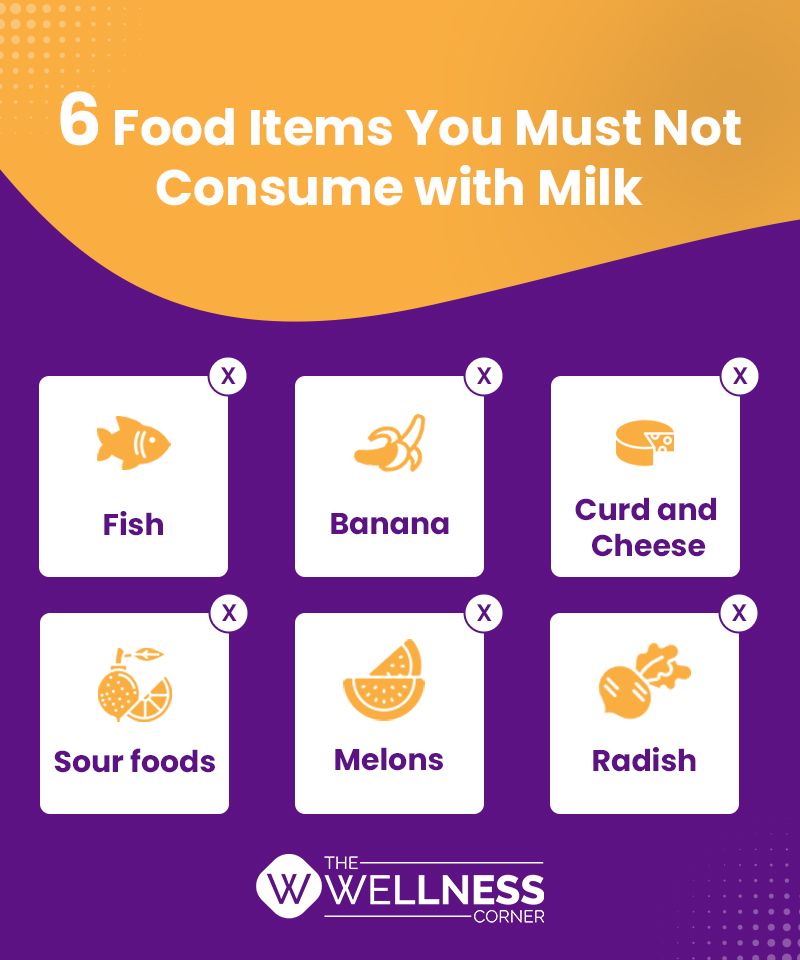Foods That Don't Really Go Well With Milk. Avoid These.
45 months ago
4 minute read.

A majority of people drink milk first thing in the morning or with their breakfast. Most prefer to drink it in combination with different items, such as bananas, protein powder, nuts, etc. But did you know that some food items combined with milk can cause problems?
Well, if you didn’t but are curious to find out, this blog is for you. Here we’ll discuss what food you should avoid with milk and what foods you should combine. So, read in full.
Common Benefits of Consuming Milk
- Milk has loads of nutrients. It is a pretty good source of vitamins and minerals.
- It gives quality protein to the body. Casein and whey protein are the two main types of protein found in it.
- Drinking milk also improves bone health and makes them stronger. It can even prevent certain bone diseases such as osteoporosis.
Let’s now move towards the foods to avoid with milk.
6 Food Items You Must Not Consume with Milk
We combine different foods with milk to relish the drink and add a certain nutrition value. But not every food combination goes the right way. Some can lead to fatigue, stomach ache, gas, or discomfort. Here are some foods that you must not consume with milk:

1) Milk and Fish
Milk and fish are two incompatible foods. Milk is cold food, and fish requires heating. According to Ayurvedic philosophy, this combination is incompatible because both the foods have completely opposite effects on our bodies. Combining them can cause digestion issues (they require different digestive juices to digest) which can alter the chemical reactions of your body and further weaken your immune system.
2) Milk and Banana
According to Ayurveda, eating bananas and milk together can disturb the agni (fire) element in our body which is plays a crucial role in digestion and metabolism of foods. It can release toxins in the body and diminish digestion. You must not consume bananas with milk, curd, or even buttermilk. Eating this food combination can also lead to cold, cough, or allergies.
If you still prefer drinking a banana milkshake, add a pinch of nutmeg powder in it to promote better digestion.
3) Milk With Curd and Cheese
Yogurt, curd, and cheese are fermented products. They should not be eaten with milk as they can block passages in the body. The combination can worsen health by increasing the chances of infections and gut issues. These foods have characteristics that are the exact opposite of milk. This is why Ayurveda advises not to combine them.
4) Milk and Sour Foods
Do not club citrus or acidic foods (Sour fruits like berries, orange, pineapple, papaya) should be avoided with milk. Milk usually takes longer to digest, and when combined with sour or acidic items, can cause heartburn or lead to the formation of gas in the body. Some people are lactose intolerant too. That means it is difficult for them to digest the lactose present in the body.
5) Milk and Melons
Often milk with fruits is considered very healthy. But fruits like melon consumed with a lot of milk can often lead to health issues. You might think you are doing the right thing by combining the healthiest fruits with milk, but you can be wrong.
Milk acts as a laxative, and melons consist of diuretic properties. This incompatible food combination can cause confusion in the intelligence of our cells. Hence teaming these ingredients can lead to toxic buildup or digestion issues that can cause vomiting or loss of motion. So, it is good not to consume these things together.
6) Milk and Radish
Generally, radish does not have any side effects on our bodies. Milk is a complete food and eating it with radish can heat you up from inside and delay the process of digestion. Therefore, it is advised not to consume it before taking any meal. Ayurveda says you must avoid consuming milk and radish as these two food items are not compatible with each other. It is time to stop taking them together if you are already doing it. It can interfere with your digestion and can cause health troubles.
A piece of advice- Drink milk at least after two hours of eating things made up of radish.
Also check out: Non-dairy Milk Versus Cow Milk
Best Foods to Pair with Milk
Milk can make your breakfast better. Everybody knows that. And what is better than consuming a breakfast that is healthy and does not harm your body in any way. Here are some scrumptious foods to pair with milk for your breakfast:
Best foods to pair with milk as per Ayurveda
The simplest and best way to drink milk, preferably fresh cow milk, is on its own. But it can be paired with-
- Honey, jaggery, or sugar enhances the taste as well as nutritional value.
- Also, they can be combined with cinnamon, cardamom, Kesar, nutmeg, or coffee to add flavor.
Other foods to try with milk
- Milk and cereals like rice/ragi/sago – This combo is nutritious and both are digested well together.
- Milk with nuts such as almonds and walnuts – Unless you are allergic to nuts or milk, you can go for nuts with milk as nuts are healthy fats and also boost energy levels.
- Milk with bread/ roti – Both bread and roti are commonly eaten food items in many regions. One can have this combo as bread/roti is easy to digest with milk.
Add these to your liking, but try not to mix anything else.
Conclusion
If it tastes good, it’s not necessarily good for your body. So, make sure to keep this in mind and combine only healthy foods with milk as stated above. However, if you need professional advice, you can always consult a dietitian.
Leave a Comment
Related Articles
Health Checks @ Home
Service
Explore
© 2025 Truworth Health Technologies Pvt. Ltd.





